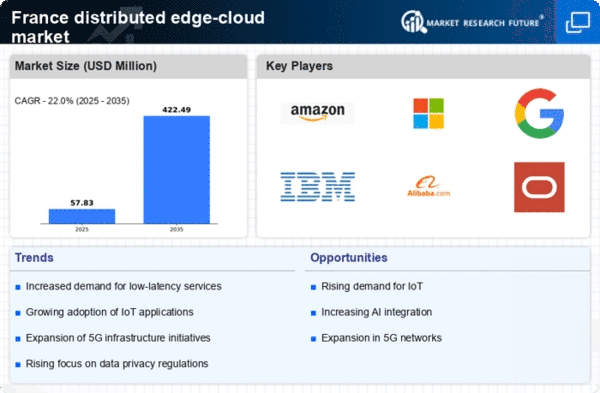Expansion of IoT Devices
The proliferation of Internet of Things (IoT) devices in France is significantly influencing the distributed edge-cloud market. With millions of devices generating vast amounts of data, the need for efficient data processing and storage solutions is critical. It is estimated that the number of connected IoT devices in France will reach over 100 million by 2026. This expansion necessitates the deployment of edge-cloud solutions to manage and analyze data closer to the source, reducing bandwidth costs and improving response times. As organizations seek to harness the potential of IoT, the distributed edge-cloud market is likely to see substantial growth, driven by the demand for scalable and flexible infrastructure.
Government Initiatives and Support
Government initiatives in France aimed at promoting digital transformation are playing a crucial role in the growth of the distributed edge-cloud market. The French government has launched various programs to encourage innovation and investment in cloud technologies, including edge computing. For instance, funding opportunities and tax incentives are being offered to companies that adopt advanced digital solutions. This supportive environment is expected to stimulate market growth, with projections indicating a potential increase in investment in distributed edge-cloud technologies by 30% over the next few years. Such initiatives not only enhance the competitive landscape but also foster collaboration between public and private sectors, further driving the distributed edge-cloud market.
Rising Demand for Low Latency Applications
The distributed edge-cloud market in France is experiencing a notable surge in demand for low latency applications. As industries increasingly rely on real-time data processing, the need for reduced latency becomes paramount. This trend is particularly evident in sectors such as finance, healthcare, and autonomous vehicles, where even milliseconds can impact performance. According to recent data, the market for low latency solutions is projected to grow by approximately 25% annually. This growth is driven by the necessity for immediate data access and processing capabilities, which distributed edge-cloud solutions can provide. Consequently, businesses are investing in these technologies to enhance operational efficiency and customer satisfaction, thereby propelling the distributed edge-cloud market forward.
Increased Focus on Data Privacy and Security
As data privacy concerns continue to rise in France, organizations are increasingly prioritizing security in their digital strategies. The distributed edge-cloud market is benefiting from this trend, as edge computing solutions offer enhanced security features by processing data closer to its source. This localized approach minimizes the risk of data breaches during transmission. Furthermore, compliance with stringent regulations such as the General Data Protection Regulation (GDPR) is driving businesses to adopt edge-cloud solutions that ensure data sovereignty and protection. It is anticipated that the emphasis on data security will lead to a 20% increase in the adoption of distributed edge-cloud technologies in the coming years, as companies seek to safeguard sensitive information.
Advancements in Artificial Intelligence and Machine Learning
The integration of artificial intelligence (AI) and machine learning (ML) technologies into the distributed edge-cloud market is transforming how data is processed and analyzed. In France, businesses are increasingly leveraging AI and ML to enhance decision-making and operational efficiency. The ability to perform complex computations at the edge allows for real-time analytics and insights, which are crucial for competitive advantage. Market forecasts suggest that the adoption of AI-driven edge-cloud solutions could grow by 40% in the next few years. This trend indicates a shift towards more intelligent and autonomous systems, positioning the distributed edge-cloud market as a key player in the future of technology.
















